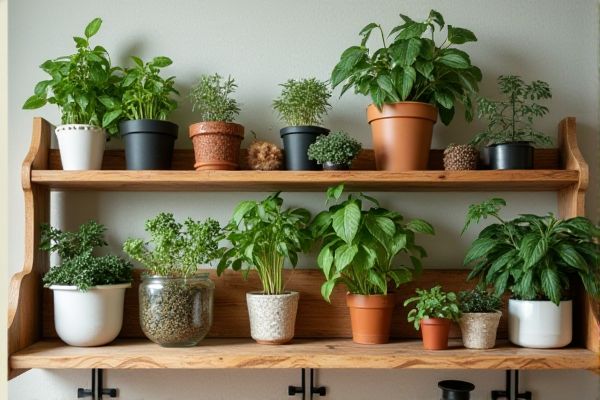
A herb rack is specifically designed to hold and organize small potted herbs, often featuring compact, space-saving designs ideal for kitchens or balconies. A tiered shelf offers versatile storage with multiple levels for larger items, making it suitable for a variety of plants or kitchen essentials; explore the full article to find the perfect option for your needs.
Table of Comparison
| Feature | Herb Rack | Tiered Shelf |
|---|---|---|
| Primary Use | Organizing and displaying fresh or dried herbs | General storage for various items, including books, decor, and plants |
| Design | Compact, often with slots or hooks for herb bunches or containers | Multiple flat levels arranged vertically for maximum storage |
| Material | Wood, metal, or bamboo optimized for kitchen use | Wood, metal, plastic, or glass based on style and need |
| Size | Small to medium, fits countertop or wall mounted | Varies from small units to large standalone shelves |
| Capacity | Limited to herb pots, bunches, or small containers | Holds a wide variety of items, not limited to herbs |
| Best For | Kitchens, herb gardeners, chefs, and culinary enthusiasts | Living rooms, offices, kitchens, versatile for multiple uses |
| Price Range | Typically lower due to specialized size and purpose | Wide range depending on size, material, and brand |
Introduction to Herb Racks and Tiered Shelves
Herb racks and tiered shelves both offer efficient solutions for organizing and displaying your plants, maximizing vertical space in kitchens, patios, or garden areas. Herb racks typically feature compact designs with multiple small compartments tailored for individual herb pots, promoting air circulation and easy access. Tiered shelves provide a stepped structure with broader surface areas, accommodating larger pots and diverse plant varieties while enhancing visibility and sunlight exposure.
Key Features of Herb Racks
Herb racks typically feature compact, wall-mounted or countertop designs ideal for growing multiple small herb plants in limited spaces. These racks often include adjustable or removable planters, built-in irrigation systems, and ample ventilation to promote healthy plant growth. Unlike tiered shelves, herb racks prioritize specialized structures that optimize light exposure and moisture control for herbs.
Advantages of Using Herb Racks
Herb racks offer space-saving vertical storage designed specifically for organizing and displaying a variety of fresh herbs, maximizing countertop or garden efficiency. They provide better air circulation and sunlight exposure, promoting healthier plant growth compared to tiered shelves. Your cooking experience improves with easy access to aromatic herbs, enhancing flavor and freshness in every meal.
Key Features of Tiered Shelves
Tiered shelves offer multiple stacked levels that maximize vertical space and provide easy access to your herbs or plants. Designed with adjustable heights in some models, they accommodate various plant sizes and pot shapes, ensuring optimal growth conditions. Their sturdy construction and space-efficient design make tiered shelves ideal for both indoor and outdoor herb organization.
Advantages of Using Tiered Shelves
Tiered shelves maximize vertical space, allowing efficient storage and easy access to multiple herb pots without overcrowding. Their graduated design improves air circulation and sunlight exposure, promoting healthier herb growth compared to flat herb racks. Tiered shelves also offer versatile organization, accommodating various pot sizes and creating an attractive, space-saving display ideal for indoor gardening.
Space Efficiency: Herb Rack vs Tiered Shelf
Herb racks maximize vertical space by housing multiple small pots in a compact, upright design, making them ideal for limited countertops or windowsills. Tiered shelves offer a broader surface area with staggered levels, allowing larger pots but requiring more horizontal space. Choosing between the two depends on available area and the size of herb containers, with herb racks excelling in tight spaces and tiered shelves better suited for spacious setups.
Aesthetic Appeal and Kitchen Design
Herb racks offer a compact and visually appealing solution, often featuring greenery that enhances kitchen ambiance with a fresh, natural touch. Tiered shelves provide versatile storage options, allowing for organized display of various kitchen items while contributing to a layered, modern design aesthetic. Both options improve kitchen functionality, but herb racks emphasize botanical charm, whereas tiered shelves prioritize spatial efficiency and style versatility.
Accessibility and Organization Comparison
Herb racks provide easy accessibility by displaying individual pots at eye level, while tiered shelves offer a layered arrangement that maximizes space and visibility for multiple plants. Accessibility is enhanced on tiered shelves through staggered placement, allowing quick identification and care of each herb. Organization on herb racks often prioritizes aesthetic presentation, whereas tiered shelves emphasize functional grouping and efficient use of vertical space.
Maintenance and Durability
A herb rack typically requires less maintenance due to its open design, allowing better airflow that reduces moisture buildup and prevents mold growth. Tiered shelves, often made from wood or metal, may demand more frequent cleaning and occasional refinishing to maintain durability against water exposure and soil spills. Your choice depends on how much time you're willing to invest in upkeep and the environment where you plan to place your herb display.
Which Storage Solution is Best for Your Needs?
Herb racks offer compact, vertical storage ideal for small kitchens, maximizing space while keeping herbs easily accessible and organized in individual pots. Tiered shelves provide broader surface areas suitable for displaying a variety of plants or kitchen items, making them versatile for larger spaces with diverse storage needs. Choosing between an herb rack and a tiered shelf depends on your available counter space, the number and type of herbs or items you wish to store, and your preferred level of accessibility and aesthetic arrangement.
 homyna.com
homyna.com